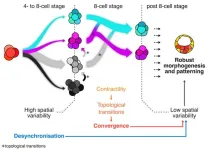(Press-News.org) Galápagos finches use their beaks to crush seeds and sing songs, so what happens to their musical trills when their beaks change to respond to new menus available under drought? Jeffrey Podos and Katie Schroeder found that the song might not remain the same after six cumulative future drought events that would likely reshape the finch beak. The projected changes in male mating songs could be so significant that they provide a pathway for ecological speciation, the researchers suggest. The researchers tested this idea by digitally modifying male mating songs of Darwin’s medium ground finches (Geospiza fortis) to sound like they might if beaks grew bigger under one, three or six cumulative future drought events. They then tested these “ghost of finches future” songs by playing them back to today’s male finches, as if the singers of the ghost songs were intruding on the males’ territory. Current males did not show signs of recognizing songs produced after six cumulative future drought events, treating the unseen producers of these songs as if they were no longer mating rivals. The study provides a better idea of how much “ecological change, and matched evolution of beaks and songs, would be required to elevate barriers to reproductive isolation,” the researchers write.
END
Galápagos finches could be singing a different song after repeated drought—one that leads to speciation
Summary author: Becky Ham
2024-10-10
ELSE PRESS RELEASES FROM THIS DATE:
Hidden “tails” slow marine snow, impacting deep sea carbon transfer and storage
2024-10-10
Newly discovered microscopic mucus tails – trailing from particles of marine snow particles – slow these particles’ descent into the deep ocean, research finds. This doubles the particles’ residence time in the ocean's upper layers and significantly alters estimates of how much carbon is sequestered in the deep sea. The oceans serve as a vast reservoir and critical sink for atmospheric carbon dioxide. A key process driving carbon sequestration in the ocean is the biological pump, where photosynthetic activity ...
Seed dispersal “crisis” may impact plant species’ future in Europe
2024-10-10
Europe is facing a seed dispersal “crisis,” due to extinction threats and population changes among the animals that do the seed dispersing, according to a new synthesis by Sara Beatriz Mendes and colleagues. Their literature review of animal and plant dispersal pairs helped them reconstruct the first European-wide seed dispersal network. Seed dispersal by animals is a critical part of maintaining healthy ecosystems, especially in fragmented environments like those found throughout Europe. Lack of seed dispersal to connect populations could prevent declining plant populations from ...
Nitrogen deposition has shifted European forest plant ranges westward over decades
2024-10-10
Researchers have documented a shift in plant species ranges toward the poles or higher latitudes in the face of climate warming, but Pieter Sanczuk and colleagues now reveal another unexpected pattern of range shift. For decades, understory plants in European temperate forests have been on the move westward, spurred by differences in nitrogen deposition rates. Westward species distribution shifts were 2.6 times more likely than northward ones, according to the researchers, who also noted that forest canopy changes played a role in this shift as well. The findings suggest that factors beyond climate change, such as atmospheric pollution, are also an important part of redistributing biodiversity. ...
Loss of lake ice has wide-ranging environmental and societal consequences
2024-10-10
Pasadena, CA—The world’s freshwater lakes are freezing over for shorter periods of time due to climate change. This shift has major implications for human safety, as well as water quality, biodiversity, and global nutrient cycles, according to a new review from an international team of researchers led by Carnegie Science’s Stephanie Hampton.
Undertaken by scientists based in the United States, Canada, and Sweden, this analysis represents a major call-to-action for wintertime freshwater ecology research. It is published in Science.
The world has millions of freshwater lakes, most of which freeze during the winter. The team’s rigorous review indicates ...
From chaos to structure
2024-10-10
Pipetting liquids into tiny test tubes, analyzing huge datasets, poring over research publications—all these tasks are part of being a scientist. But breaking this routine is essential. Time away from the usual work environment can spark creative ideas. Lab retreats, for instance, offer a great setting where researchers can engage with other peers, often leading to new collaborations.
The latter was true for Bernat Corominas-Murtra and Edouard Hannezo from the Institute of Science and Technology Austria (ISTA). Fascinated by a dataset showcased during a poster session at a collaborative ...
Variability in when and how cells divide promotes healthy development in embryos
2024-10-10
There is variability in when and how cells divide during the development of embryos. While researchers traditionally believed this variability was an obstacle that needed to be regulated, the Hiiragi group now found that it actually promotes healthy development. The results, published in Science on 11 October 2024, encourage other scientists to see the potential of variability and could have significant impact on assisted reproductive technology.
An embryo consists of cells. These cells divide to make new cells, allowing the embryo to grow. The cells experience variability in how and when they divide and in how they interact with each other. Scientists ...
Hidden biological processes can affect how the ocean stores carbon
2024-10-10
New Stanford-led research unveils a hidden factor that could change our understanding of how oceans mitigate climate change. The study, published Oct. 11 in Science, reveals never-before seen mucus “parachutes” produced by microscopic marine organisms that significantly slow their sinking, putting the brakes on a process crucial for removing carbon dioxide from the atmosphere. The surprising discovery implies that previous estimates of the ocean’s carbon sequestration potential may have been overestimated, but also paves the way toward improving climate models and informing ...
European forest plants are migrating westwards, nitrogen main cause
2024-10-10
New research reveals nitrogen pollution, and to a lesser extent climate change, unexpectedly as the key driver behind surprising westward shifts in the distribution of plants.
A recent study has uncovered that many European forest plant species are moving towards the west due to high nitrogen deposition levels, defying the common belief that climate change is the primary cause of species moving northward. This finding reshapes our understanding of how environmental factors, and in particular nitrogen pollution, influence biodiversity.
While it is widely assumed that rising temperatures are pushing many species toward cooler, northern areas, this research shows that westward ...
Macronutrient and micronutrient intake among US women ages 20 to 44
2024-10-10
About The Study: This cross-sectional study of pregnant and nonpregnant women of reproductive age found that vitamin A, vitamin C, and iron intake decreased over the past 2 decades, which may have substantial maternal and fetal health implications. By identifying these nutrient gaps and trends in inadequate intake in this at-risk population, scientific, health care, and regulatory communities may be better poised to adopt recommendations to improve nutrient intake.
Corresponding Author: To contact the corresponding author, Derek Miketinas, PhD, RD, email dmiketinas@twu.edu.
To access the embargoed study: Visit our For The Media website ...
Payments by drug and medical device manufacturers to us peer reviewers of major medical journals
2024-10-10
About The Study: More than half of the 1,962 U.S. physicians included in this study who peer reviewed for the most influential medical journals received industry payments in 2020-2022, with most payments for research. Research payments, especially those provided to an institution, may have different implications than general payments for conflicts of interest.
Corresponding Author: To contact the corresponding author, Christopher J. D. Wallis, MD, PhD, email wallis.cjd@gmail.com.
To access the embargoed study: Visit our For The Media website at this link https://media.jamanetwork.com/
(doi:10.1001/jama.2024.17681)
Editor’s Note: Please see the article ...
LAST 30 PRESS RELEASES:
A promising potential therapeutic strategy for Rett syndrome
How time changes impact public sentiment in the U.S.
Analysis of charred food in pot reveals that prehistoric Europeans had surprisingly complex cuisines
As a whole, LGB+ workers in the NHS do not experience pay gaps compared to their heterosexual colleagues
How cocaine rewires the brain to drive relapse
Mosquito monitoring through sound - implications for AI species recognition
UCLA researchers engineer CAR-T cells to target hard-to-treat solid tumors
New study reveals asynchronous land–ocean responses to ancient ocean anoxia
Ctenophore research points to earlier origins of brain-like structures
Tibet ASγ experiment sheds new light on cosmic rays acceleration and propagation in Milky Way
AI-based liquid biopsy may detect liver fibrosis, cirrhosis and chronic disease signals
Hope for Rett syndrome: New research may unlock treatment pathway for rare disorder with no cure
How some skills become second nature
SFU study sheds light on clotting risks for female astronauts
UC Irvine chemists shed light on how age-related cataracts may begin
Machine learning reveals Raman signatures of liquid-like ion conduction in solid electrolytes
Children’s Hospital of Philadelphia researchers emphasize benefits and risks of generative AI at different stages of childhood development
Why conversation is more like a dance than an exchange of words
With Evo 2, AI can model and design the genetic code for all domains of life
Discovery of why only some early tumors survive could help catch and treat cancer at very earliest stages
Study reveals how gut bacteria and diet can reprogram fat to burn more energy
Mayo Clinic researchers link Parkinson's-related protein to faster Alzheimer's progression in women
Trends in metabolic and bariatric surgery use during the GLP-1 receptor agonist era
Loneliness, anxiety symptoms, depressive symptoms, and suicidal ideation in the all of us dataset
A decision-support system to personalize antidepressant treatment in major depressive disorder
Thunderstorms don’t just appear out of thin air - scientists' key finding to improve forecasting
Automated CT scan analysis could fast-track clinical assessments
New UNC Charlotte study reveals how just three molecules can launch gene-silencing condensates, organizing the epigenome and controlling stem cell differentiation
Oldest known bony fish fossils uncover early vertebrate evolution
High‑performance all‑solid‑state magnesium-air rechargeable battery enabled by metal-free nanoporous graphene
[Press-News.org] Galápagos finches could be singing a different song after repeated drought—one that leads to speciationSummary author: Becky Ham



